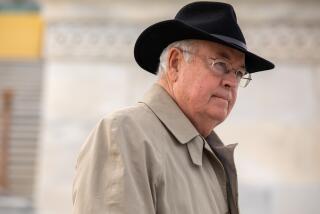Kenneth Starr’s Chamber of the Absurd
- Share via
It’s absurd. Kenneth Starr is going to investigate himself. In the face of allegations that money from Starr’s benefactor, Richard Mellon Scaife, may have corrupted his key witness in the Whitewater case, the Justice Department has asked Starr to inquire into possible criminal witness-tampering.
In a letter to Starr last week, Dep. Atty. Gen. Eric H. Holder Jr. urged Starr to investigate charges that convicted felon David Hale “may have received cash and other gratuities from individuals seeking to discredit the president during a period when Hale was actively cooperating with your investigation.”
For the record:
12:00 a.m. April 15, 1998 For the Record
Los Angeles Times Wednesday April 15, 1998 Home Edition Metro Part B Page 7 Op Ed Desk 2 inches; 40 words Type of Material: Correction
Wrong name: Robert Scheer’s column Tuesday incorrectly identified the employer of someone related to a figure in Kenneth Starr’s Whitewater investigation. It should have read: “Joshua Rand, who worked for [Parker] Dozhier, claims he was instructed to hand over money to [David] Hale.”
Federal prosecutors in Arkansas examined charges raised by the on-line magazine Salon, the Associated Press and the New York Observer and found, Holder wrote, “that the information warranted further investigation.”
Holder stated that if Starr felt he had a conflict of interest, he should turn the matter over to the Justice Department.
Excuse me? Is there any question of a conflict of interest? The money that may have tainted Hale allegedly came from tax exempt foundations funded by Scaife, the right-wing billionaire who has helped finance the program at Pepperdine University that Starr will head.
Scaife has also funded the ultra-right American Spectator magazine, which ran the mudslinging “Troopergate” story that led to Paula Jones’ lawsuit. The writer, David Brock, recently recanted the story.
The allegation to be investigated by Starr is whether some of the $1.7 million in tax-exempt money that Scaife’s foundations reportedly funneled through the magazine’s “Arkansas project” to undermine Clinton ended up in Hale’s pocket.
After a four-year, $40-million investigation, Hale is the only witness Starr can produce to link the president with Whitewater. Hale linked Clinton with Whitewater only after he was convicted in an unrelated matter and plea bargained with Starr.
A cozy connection between Hale and the Scaife-funded American Spectator was conceded by James Adams, who wrote many of its Whitewater articles. He told the New York Times that the magazine provided Hale with a “safe house” and money for phone calls to the magazine.
A long-time Hale friend, Parker Dozhier, admitted to the AP that he was paid $35,000 by the American Spectator magazine and that he supplied Hale with a fishing cabin retreat and auto, but Dozhier denies making cash payments. Hale admits using the cabin on six occasions. FBI agents working for Starr reportedly accompanied him there. His former girlfriend and bookkeeper, Caryn Mann, said Dozhier paid Hale money. Her son, Joshua Rand, who worked for Hale, claims he was instructed to hand over money to Hale. According to Salon writer Murray Waas, Dozhier said Rand was “destined to be a chalk outline somewhere.” This, Holder noted in his letter to Starr, could “be interpreted as a threat against the witness.”
Mark Geragos, lawyer for Susan McDougal, who was convicted of fraud in a Whitewater deal on the basis of Hale’s testimony, claimed that “David Hale was bought and paid for” and that Starr knew this. Geragos charges that the FBI agents accompanying Hale informed Starr of those payments in reports called 302s, which were never turned over to McDougal’s attorneys as required by law.
Starr needs to look into the use of tax-exempt money from various Scaife foundations. When Ronald Burr, the American Spectator’s publisher for 30 years, reportedly attempted to hire an outside accounting firm to audit those funds, he was fired.
Instead, an inquiry was conducted by Theodore B. Olson, director of the American Spectator Educational Foundation, which owns the magazine. Olson, a close friend and former law partner of Starr, was Hale’s lawyer during the Whitewater congressional investigations.
American Spectator publisher Terry Eastland, who was put in charge of the magazine after Burr was ousted, describes himself as a “good friend” of Starr.
Starr was appointed to this job when Appeals Court judges ruled that his predecessor, Robert B. Fiske Jr., had an “apparent” conflict of interest because he had been appointed by Janet Reno. While stating that no one questioned Fiske’s integrity, the judges held that the Independent Counsel Act “contemplates an apparent as well as actual independence on the part of the counsel.”
How “apparent” does it have to get before the hopelessly conflicted Starr is removed as the lead player in this farce?
More to Read
Sign up for Essential California
The most important California stories and recommendations in your inbox every morning.
You may occasionally receive promotional content from the Los Angeles Times.













